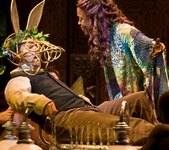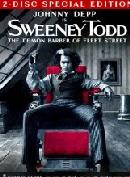SITE GUIDE
SEARCH
REVIEWS
REVIEW ARCHIVES
ADVERTISING AT CURTAINUP
FEATURES
NEWS
Etcetera and
Short Term Listings
LISTINGS
Broadway
Off-Broadway
NYC Restaurants
BOOKS and CDs
OTHER PLACES
Berkshires
London
California
New Jersey
DC
Connecticut
Philadelphia
Elsewhere
QUOTES
TKTS
PLAYWRIGHTS' ALBUMS
LETTERS TO EDITOR
FILM
LINKS
MISCELLANEOUS
Free Updates
Masthead
Writing for Us
A CurtainUp California Review
A Midsummer Night's Dream
|
What fools these mortals be! — Puck |

Lucas Caleb Rooney as Bottom and Charlayne Woodard as Titania
(Photo by Craig Schwartz) |
Well, that's the beauty of Shakespeare, isn't it? That his plays are so infinitely malleable. That quarterbacks and cheerleaders can half-heartedly muddle through one of his comedies, and it's still funny. That a lighthearted piece of frivolity like Midsummer can stand the test of time, and still be enjoyable and relevant 400 years later.
The general plot is probably familiar. Theseus, the duke of Athens, is getting ready to marry Hippolyta, and needs entertainments for his four-day celebration. Egeus, a nobleman, brings his daughter Hermia to Theseus. He wants her to wed Demetrius; she is in love with Lysander. Theseus threatens to have her executed if she doesn't obey her father, so she and Lysander make plans to run away and marry elsewhere. She tells her friend Helena of their plans; Helena, who is desperately in love with Demetrius, who wants nothing to do with her.
The four lovers end up in the woods outside of Athens. Also in the woods are a straggling band of actors, rehearsing a play for Theseus; and fairies; their queen, Titania; and king Oberon who sends Puck to drip a love potion in Titania's eyes, making her fall in love with the first person she sees upon waking. Naturally, he wants her to fall in love with him, but instead, she falls for one of the actors, Bottom, whose head Puck has transformed into the head of a donkey. Puck also gets some love potion on Lysander, who falls in love with Helena and abandons Hermia. Then Demetrius gets some, and also falls in love with Helena.
Eventually, it all gets straightened out. Demetrius and Helena wed, Lysander and Hermia wed, Titania and Oberon wed, and Theseus and Hippolyta wed. The actors present their play, Pyramus and Thisbe, with Bottom's proper human head restored. And all is well.
It's been a summer of Shakespeare here in San Diego; three plays of his at the Old Globe, and now Midsummer at La Jolla Playhouse. This is definitely the prettiest production of Midsummer I've ever seen. Visually, it's somewhere between Alice in Wonderland and Cirque du Soleil, full of sparkle and whimsy. There are even acrobats. The furniture flies (including the piano, which turns end over end in a stunt reminiscent of Tommy Lee's drum set) and the fairies cavort in massive upside-down chandeliers, mirrors become pools of water. What appears to be a large Victorian drawing room becomes a forest of chandeliers and window panes; the furniture and curtains fly away, the maids turn into fairies, the butler becomes Puck. There's an on stage orchestra to play selections from Mendelssohn's "Midsummer Night's Dream."
David C. Woolard's costumes are easily the most stunning element. Some of them are literally upside-down, to mirror the furniture; Hippolyta's skirt and Bottom's donkey head are elaborate woven golden cages. Each one is beautiful and carefully crafted and unique, and these costumes combined with Neil Patel's set design make the play.
As you might expect, Bottom (Lucas Caleb Rooney) and Puck (Martin Moran) are the most engaging cast members. They keep the entire production from spinning off into mere spectacle. The lovers, I'm afraid, aren't nearly as good. Hermia (Amelia Campbell) and Helena (J. Smith-Cameron) are shrill, Demetrius (Sean Mahon) and Lysander (Tim Hopper) are dull. I had a hard time believing anyone could love any of them. Daniel Oreskes as Theseus and Oberon and Charlayne Woodard as Hippolyta and Titania have a commanding stage presence, and the fairies are nimble and acrobatic. But I found myself more interested in the set and costumes than in the actors, or the story.
Despite the above reservations this is a great evening. All the visual surprises and delights more than make up for the shortcomings. While production-heavy plays often overshadow the text and the talent in La Jolla Playhouse's Midsummer, the production is the talent. All the elements tie together to become a fantasy, not just a spectacle—-surely what Shakespeare must have imagined when he wrote it.
|
A Midsummer Night's Dream Written by William Shakespeare Directed by Christopher Ashley With Kyle Anderson, Ken Berkeley, Amelia Campbell, Cate Campbell, Maggie Carney, Maritxell Carrero, Matthew Cusick, Matthew Patrick Davis, Sara Garcia, Zachary Harrison, Tim Hopper, Sean Mahon, Jonathan McMurtry, Hugo Medina, Martin Moran, Amanda Naughton, Daniel Oreskes, Tatyana Petruk, Christopher Douglas Reed, Lucas Caleb Rooney, J. Smith-Cameron, Anne Stella, Charlayne Woodard, and Bowman Wright Set Design: Neil Patel Lighting Design: Howell Binkley Sound Design: Leon Rothenberg Costume Design: David C. Woolard Music: Mark Bennett and Felix Mendelssohn Running Time: Two hours and fifteen minutes with one fifteen-minute intermission La Jolla Playhouse, 2910 La Jolla Village Drive, San Diego; (858) 550-1010 Tickets $31 - $66 Tuesdays and Wednesdays at 7:30 pm; Thursdays, Fridays and Saturdays at 8 pm; Sundays at 7 pm; Saturday and Sunday matinees at 2 pm July 20 - August 22, 2010 Reviewed by Jenny Sandman based on July 29th performance |
|
Subscribe to our FREE email updates with a note from editor Elyse Sommer about additions to the website -- with main page hot links to the latest features posted at our numerous locations. To subscribe,
E-mail:  esommer@curtainup.comesommer@curtainup.com esommer@curtainup.comesommer@curtainup.comput SUBSCRIBE CURTAINUP EMAIL UPDATE in the subject line and your full name and email address in the body of the message -- if you can spare a minute, tell us how you came to CurtainUp and from what part of the country. Visit Curtainup's Blog Annex Curtainup at Facebook . . . Curtainup at Twitter REVIEW FEEDBACK Highlight one of the responses below and click "copy" or"CTRL+C"
Paste the highlighted text into the subject line (CTRL+ V): Feel free to add detailed comments in the body of the email. . .also the names and emails of any friends to whom you'd like us to forward a copy of this review. |






